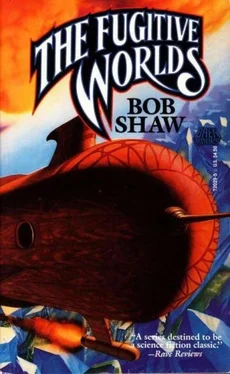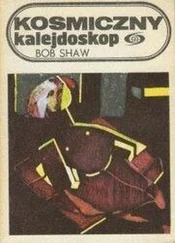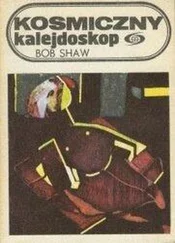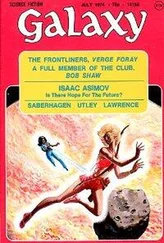Bob Shaw - The Fugitive Worlds
Здесь есть возможность читать онлайн «Bob Shaw - The Fugitive Worlds» весь текст электронной книги совершенно бесплатно (целиком полную версию без сокращений). В некоторых случаях можно слушать аудио, скачать через торрент в формате fb2 и присутствует краткое содержание. Год выпуска: 1990, ISBN: 1990, Издательство: Baen Books, Жанр: Фантастика и фэнтези, на английском языке. Описание произведения, (предисловие) а так же отзывы посетителей доступны на портале библиотеки ЛибКат.
- Название:The Fugitive Worlds
- Автор:
- Издательство:Baen Books
- Жанр:
- Год:1990
- ISBN:0-671-72029-5
- Рейтинг книги:3 / 5. Голосов: 1
-
Избранное:Добавить в избранное
- Отзывы:
-
Ваша оценка:
- 60
- 1
- 2
- 3
- 4
- 5
The Fugitive Worlds: краткое содержание, описание и аннотация
Предлагаем к чтению аннотацию, описание, краткое содержание или предисловие (зависит от того, что написал сам автор книги «The Fugitive Worlds»). Если вы не нашли необходимую информацию о книге — напишите в комментариях, мы постараемся отыскать её.
The Fugitive Worlds — читать онлайн бесплатно полную книгу (весь текст) целиком
Ниже представлен текст книги, разбитый по страницам. Система сохранения места последней прочитанной страницы, позволяет с удобством читать онлайн бесплатно книгу «The Fugitive Worlds», без необходимости каждый раз заново искать на чём Вы остановились. Поставьте закладку, и сможете в любой момент перейти на страницу, на которой закончили чтение.
Интервал:
Закладка:
“But for anyone to do what you have done … for you to have flown one of those antiquated wooden barrels through the black deeps of space to another world … for you simply to be here…
“All I can say is that Vantara is the luckiest woman in all of history, and that you will have no need, ever again, to stand in the shadow of your grandfather. There can never be any doubt that you and he were peers.”
Toller blinked to ease a sudden smarting in his eyes. “I value what you say, but all I did…”
“Tell me something.” Jerene switched to a tone of practicality rather sooner than Toller might have liked. “Have the monsters cast a spell over us? How is it that we can hear what they say, even when they are not in our presence, even when there is no sound? Is it magic?”
“There is no magic,” Toller explained, again aware of the gulf which had opened between him and his kind. “It is the Dussarran way. They have progressed far beyond the need for shaping words with their mouths. They speak mind-to-mind, no matter how great the distance involved. Have these things not been explained to you?”
“Not a word. We are animals in a zoo as far as they are concerned.”
“I suppose I received my education because the scarecrow I dealt with was buying time, preserving his life.” Toller looked around the galleried dome with distaste. “When do the Dussarrans communicate with you?”
“There is one who seems to be known as the Director,” Jerene replied. “He will speak to us for hours at a time—always asking questions about our lives on Overland, about our families, about our food, farming methods, the differences between men’s clothing and women’s clothing… Nothing is too trivial for him.
“Then there is another one—possibly a female—who gives us our orders.”
“What manner of orders?”
Jerene shrugged. “When to leave our cells and come down here to the main floor… that sort of thing. We stay here while the food and water is being replenished up there by one of the monsters.”
“Does this so-called Director ever visit you in person? Do you ever get Dussarrans who seem to be important figures in their own society making close inspections?”
“It is difficult for us to tell. We sometimes see groups of the monsters behind that partition, but…” Jerene indicated a glazed, box-like structure which enclosed one of the entrances to the dome, then she gave Toller a thoughtful look. “Why do you enquire of such things, Toller?”
He gave her a thin smile. “I have lost one perfectly good hostage—now I am in the market for another.”
“But after what you have told us … It is impossible to escape from here.”
“You are wrong on that point,” Toller said quietly, his expression becoming somber. “It is possible to escape from any stronghold… provided that one’s heart is sufficiently set on it… provided that one is prepared to risk making the ultimate escape…”
Toller and Steenameert were arguing about traditional and modern methods of constructing furniture, with emphasis on the design of chairs.
“Don’t forget that we have had iron for only fifty years or so,” Toller said. “The design of brackets and angle braces will improve; the design of woodscrews will improve.”
“That is of little import,” Steenameert countered. “Furniture should be regarded as a form of art. A chair should be regarded as a sculpture as much as a contrivance for supporting fat arses. Any artist will tell you that wood should only be mated to wood. Tenons and dovetails are natural, Toller, and not only are they much stronger than your wood-and-metal hybrids, they have a tightness which…”
He continued speaking as Toller knelt and tested the gallery flooring with a heavy webbing-repair needle taken from his emergency pouch. Toller looked up at him and shook his head, signifying that the floor construction was too strong to be ripped upwards in a surprise raid on anybody who happened to be underneath. They were in the part of the first gallery directly above the enclosure where, according to Lieutenant Pertree, groups of Dussarrans sometimes gathered to observe their captives.
“Yes, but ever since the Migration only the rich have been able to employ the services of competent joiners,” Toller said as he straightened up. “Surely it is better for the ordinary citizen and his family to have something to plank their arses on—and I doubt if many of the said arses are fat—than for them to squat on the floor.”
Toller and Steenameert were openly talking about furniture design—a subject which evoked mental images of joints and frames—and at the same time were searching for weak points in the structure of their prison. They continued the contrived discussion as they made their way downstairs to the enclosure itself. They were novices, true primitives, in the darkly glimmering and bottomless world of telepathic communication, but they had gleaned enough from their encounter with Divivvidiv to believe that the aliens were fallible and could be deceived. It was likely that attempts were being made to eavesdrop on their innermost thought processes, but Kolcorronians were warriors by instinct and had a talent for misleading enemies.
“You can’t deny that doors have been improved by the addition of iron hinges and fittings,” Toller said as he reached the enclosure. In general it was surprisingly similar to what an artisan from Land or Overland would have built for the same purpose. It was a rectangular three-element structure with one edge attached to the wall on each side of an entrance to the dome. The three faces ran from the floor to the underside of the first gallery, and were glazed from waist-level upwards.
Still arguing about historical developments in his home world’s carpentry, Toller casually leaned against a corner of the enclosure and felt it shift slightly. He stood head and shoulders above all the aliens he had seen, and furthermore was built in much bulkier proportions, from which facts he estimated that his body weight was at least three times that of the average Dussarran. His physical power could be factorized upwards again, because of differences in muscle density, making him a force that Divivvidiv and his kind were unaccustomed to dealing with. There was a good possibility that a structure which a Dussarran saw as a formidable barrier could be breached by a single charge from Toller and Steenameert.
The alien captors had many undeniable advantages over the handful of Kolcorronians, but—Toller hoped—they were too sure of themselves, too complacent. Their best thinkers seemed to be expending their energies on remote abstracts, such as the dissolution of galaxies, while dismissing more immediate threats from close at hand. They were like high kings preparing defenses against global enemies, and all the while ignoring the body servant with the phial of poison or the smiling concubine with the slim dagger…
“I concede the point about doors and door furniture, but that is. a special case,” Steenameert said, nodding significantly as he tested a panel with his foot. “Metal has a natural function there, but it will always be out of place when you come to chairs and tables.”
“We shall see what we shall see,” Toller replied as they continued their leisurely circuit of the dome.
They had been imprisoned for an indeterminate time, only a few hours, but already Toller’s impatient and turbulent nature was rebelling against the monotony of confinement. A telepathic voice with indefinable female undertones had directed him and Steenameert to particular cells on the first gallery. Toller had inspected his briefly and then, being uncooperative on principle, had announced that he did not like it and was going to use another. As the cells were identical, and did not even have doors, there was no reason to prefer one above any other, but the reaction he had hoped to provoke did not occur.
Читать дальшеИнтервал:
Закладка:
Похожие книги на «The Fugitive Worlds»
Представляем Вашему вниманию похожие книги на «The Fugitive Worlds» списком для выбора. Мы отобрали схожую по названию и смыслу литературу в надежде предоставить читателям больше вариантов отыскать новые, интересные, ещё непрочитанные произведения.
Обсуждение, отзывы о книге «The Fugitive Worlds» и просто собственные мнения читателей. Оставьте ваши комментарии, напишите, что Вы думаете о произведении, его смысле или главных героях. Укажите что конкретно понравилось, а что нет, и почему Вы так считаете.












